Dr. Mai Liem Truc, former Director General of the General Department of Posts and Telecommunications , former Permanent Deputy Minister of Posts and Telecommunications, is an important figure in the Vietnamese post and telecommunications industry during the renovation period. He firmly advocated bringing the Internet to Vietnam early, and played a key role in promoting competition, creating a breakthrough development for the telecommunications and information technology sector.
He shared with VnExpress about his bold decisions and experience in removing bottlenecks in the management mechanism to solve challenges in the development of the telecommunications industry.
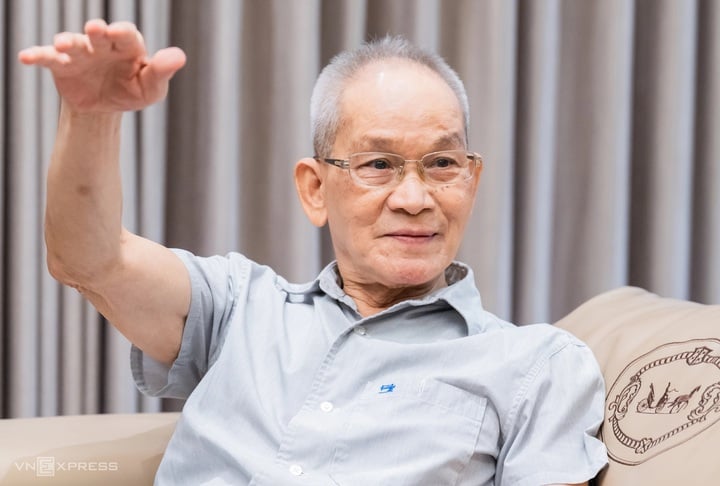
"We recognize the flaws of monopoly ourselves"
- In the 1990s, the postal industry developed strongly, was considered the leading economic and technical sector in the Renovation process, and was awarded the Gold Star Medal in 1995. In that context, what made you and your colleagues still decide to promote the elimination of monopoly and open competition in the industry?
- At that time, the postal industry was at its peak, contributing greatly to the development of the country. The people and society in general did not complain much about the monopoly in telecommunications.
However, we - the insiders - clearly see the shortcomings of the market and are very concerned. Our generation came out of the war, always keeping in mind that whatever is beneficial to the people, we must try to do, as Uncle Ho taught. If we continue to have a monopoly, the price will remain high, the management and operation will stagnate and we do not know when the telephone will become popular.
Once, we reported to Prime Minister Vo Van Kiet about the target of having one telephone for every 100 people by the year 2000. He asked: "Why is it so slow? Is there a faster way?" At that time, we did not know and could not answer. But I understood that there must be another way, the progress was really too slow.
Vietnam was also under pressure to integrate internationally. At that time, we began negotiating the Vietnam-US Bilateral Trade Agreement (BTA). The US made very high demands on foreign ownership rights when investing in Vietnam. Negotiations between the two sides lasted for many years to narrow the differences.
The final negotiations took place in the US. The Vietnamese side was led by Minister of Trade Vu Khoan. One day, I received a call from the US saying that there were still problems in the telecommunications and banking sectors. Deputy Prime Minister Nguyen Manh Cam called me (at that time, Director General of the General Department of Posts) and asked: with such problems, how should we "open up" to sign the agreement? I reported the options and "key points" that I could maintain, and at the same time affirmed that sooner or later the telecommunications market must be opened, not only domestically, but also internationally. If we do not reduce rates and expand the number of users in time, domestic enterprises will have difficulty standing firm when foreign investors enter the market.
Honestly, I feel lucky that I did not hinder the signing of the Agreement. If we had insisted on maintaining our monopoly and not opening up to foreign countries, it would have been difficult to sign the BTA.
- What are the biggest challenges in the process of opening the market?
- Opening up the telecommunications market - an industry with a history of natural monopoly - is of course very complicated and faces many challenges.
The country had just gone through a war, when it gained independence, the whole society, especially the leaders, were very sensitive to the issue of national security. Telecommunications is an important communication industry, there were many concerns about the risk of revealing national secrets, spreading harmful information...
The second challenge is related to the specific characteristics of the telecommunications industry, as well as the electricity, water, aviation industries... Management units and enterprises are all familiar with the monopoly mechanism. The transition to a competitive model is therefore very complicated, disrupting the inherent relationship structure between management agencies and enterprises as well as affecting the interests of market participants.
Telecommunications is also a high-tech industry with many strict technical, professional and procedural requirements. This industry needs a professional team, complying with international information standards and regulations. New businesses will face many difficulties in capital, human resources and technology.
Thus, to open up and promote competition, we must solve at least the following problems: ensuring national information security, changing management thinking, and supporting and helping new businesses entering the market.
- What bold decisions or steps helped solve the above problems?
- During this process, I remember two turning points.
The first milestone was the launch of Internet services in Vietnam on November 19, 1997. I signed four Internet business licenses at the same time, creating competition right from the start for VDC, FPT, Netnam and Saigonnet.
The State leaders at that time required "to manage to where, to open to where", so we still kept the exclusive right to the international gateway for VNPT. But only a few years later, thanks to demonstrating good management ability, and with the issuance of Directive 58, changing to the mindset of "to develop to where, to manage to where", we allowed Internet service providers (ISPs) to build international gateways, without going through VNPT anymore.
Opening up to Internet competition is not too difficult because the number of people using dial-up phone lines is still small, and revenue is low, so it has not had a big impact on businesses.
But the second turning point - opening the telecommunications market - is much more complicated because of the large revenue, strongly affecting business interests.
We are determined, transparent and flexible in deploying VoIP (Voice over Internet Protocol) services. VNPT is currently doing well with IDD (International Direct Dialing) services, so it is not interested in VoIP.
Viettel was established a few years ago and was struggling to find a foothold in the market. They were full of ambition. The company leaders submitted a very detailed project and became the only unit in Vietnam licensed to provide VoIP 178 service on February 3, 2000. With just over two billion VND in capital, Viettel managed very well to open the line on October 15, 2000.
That night, I was watching the news and saw VTV airing an advertisement: "178, your savings code", I felt like an electric current was running through me, because I - who was a VNPT employee - was used to the monopoly, suddenly there was another side advertising. I realized that small advertisement would be a breakthrough, creating a big change, affecting the lives of tens of millions of people.
Then came the day when Viettel’s revenue growth impacted VNPT’s interests. VNPT complained that new businesses were allowed to operate in big cities with good infrastructure, while they had to provide services to border, island, remote areas with low profit margins, which was unfair.
When it comes to fairness, the State - in this case the General Department - must act as the arbitrator.
We build a profit sharing mechanism. For example, calling overseas via VoiP, Viettel charges 1.3 USD. But if calling from Hanoi, Ho Chi Minh City, Da Nang, VNPT gets 65 cents, and calling from other provinces, VNPT gets 75 cents. That means Viettel has to share the profit with VNPT.
From October 2000 to July 2001, after Viettel successfully piloted, we licensed VNPT and other businesses. When the VoIP market was operating well, the General Department let businesses decide their own prices. We built the Post and Telecommunications Ordinance, opened a Public Telecommunications Fund with contributions from businesses, and any business that deployed public services would take budget from this fund.
With comprehensive reform of technology and institutions, by 2010, Vietnam's telecommunications industry had formed a relatively complete competitive market and had a very fast growth rate. Prices were reduced, service quality was improved. Thus, the people benefited and the country developed.
"Heavy pressure from the Prime Minister's pat on the shoulder"
- In addition to facing and solving problems from the business side, what other pressures do you face from senior leaders?
- It is true that we face certain pressures. Many leaders support us, but others are also concerned, and the concerns are completely understandable.
In a meeting at the General Post Office, we were reporting on the post and telecommunications industry development strategy to a very high-ranking leader, who often interrupted us mid-sentence. I knew that, so I let Deputy General Director Nguyen Huy Luan report, and I was the "reserve player", in case Mr. Luan was cut off, I would still "live" to continue fighting.
As expected, when it came to the "opening and competition" part, he said: "This cannot be managed, it will lose socialism." At that time, I spoke softly: "In 1945, the whole country had 5,000 party members, the fate of the country was hanging by a thread, but Uncle Ho and the Party still overcame it. Now the country has 2 million party members, an army, and a government, why should we be afraid, we must believe in the people."
After listening to me, the old man was silent. Mr. Luan was also quick-witted, seeing that no one else said anything, he stood up and continued reading the report. We escaped the tense moment of the meeting.
There were times when the presentation did not go well, and the team members were frustrated. I had to encourage them: if we could not convince the leaders, it was because we were bad. Having gone through so much loss and sacrifice to gain independence, the pressure to maintain peace was great. The elders were worried.
When I brought the Internet to Vietnam, I once met Prime Minister Phan Van Khai at his home to report, ask for his opinion and receive his support. But as soon as I left the door, the Prime Minister patted me on the shoulder and said: "Truc, try to manage the Internet well. If you open it up and then have to close it down, I don't know how to talk to the world."
I was silent, this very light pat on the shoulder suddenly weighed more than all the pressure from the resolutions.
Therefore, it is not easy for us to just talk. We must commit to numbers and prove it with results. For example, before the Internet was opened, letters to remote areas were delayed for months, newspapers could not be sent abroad, communication within and outside the country, and between overseas Vietnamese and their homeland encountered countless difficulties... Thanks to the Internet, electronic newspapers have developed strongly, such as the Que Huong page, VnExpress newspaper, Vietnam Economic Times... Naturally, our media has improved significantly. Sometimes I have to cite such evidence as a counterweight, so that leaders can be less worried that the Internet only spreads harmful information.
- What lessons from the telecommunications industry do you think are universal and can be applied to other industries that want to move from monopoly to competition?
- I dare not say it is a lesson, because each industry has its own characteristics, with its own advantages and difficulties. But it is true that this process has certain common points.
Firstly, opening up to competition is an inevitable trend. Without opening up and competition, the country will find it difficult to make a breakthrough and the people will not benefit. Without competition in telecommunications, how can there be cheap fares? Without opening up to aviation, how can people fly at cheap prices?
Depending on the field, the transition process has different lengths. Telecommunications, electricity, aviation, water supply and drainage... were all monopolies, and it was very difficult and complicated to change. It is the same in other countries. But the common point is to open up, do not avoid or delay; the more you avoid and delay, the greater the overall consequences for the country and society.
Second, the will of the state leadership and the efforts of the monopoly enterprises will determine success. For example, if the state wants to have new enterprises, it must have an incentive mechanism. Ensuring fair competition is a given, but at certain stages, it must create favorable conditions for new enterprises and new markets to develop rapidly. When everything is running smoothly, the state can let go and let the market regulate itself.
Monopolies must also make efforts to change to adapt, have a long-term vision, and put long-term development goals above short-term benefits.
Third, during the implementation process, there must be a clear roadmap, what to open first, what to open later depends on each industry and each development stage, and at the same time, it is necessary to change the state management mindset as well as the way of business administration.
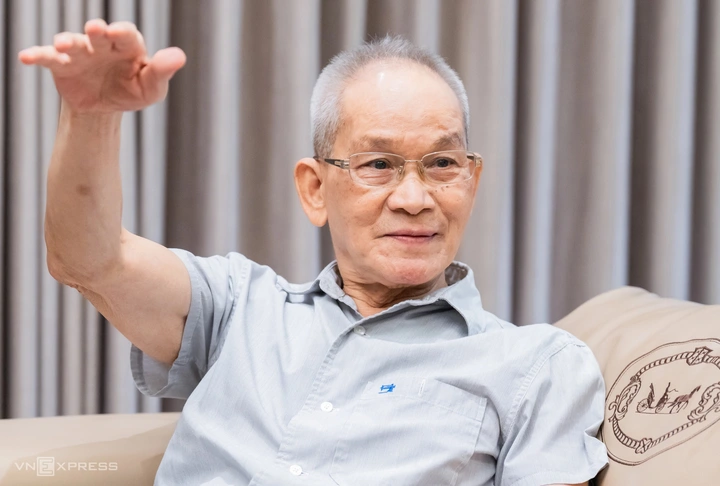
"The country is changing, every industry must reform"
- Resolution 70 has just been issued, setting the goal of ensuring energy security until 2030, with a vision to 2045, while also requiring the construction of a competitive and transparent electricity market. How do you assess the opportunities for change in the electricity industry in this context?
- Resolution 70 aims to ensure energy security, while also requiring the opening of competition in the electricity market, so that people have the right to choose suppliers, especially in the retail sector. This is a turning point to ensure national energy security and electricity demand, serving the economy with double-digit growth.
The prerequisite is that the will of the top leadership has been demonstrated. The goals for the electricity industry are also clear. The demands of the people and society for reform and innovation in the electricity industry are high. These are all strong pressures, but also a favorable context for the electricity industry.
The remaining task is to deploy and implement. In my opinion, close direction from the top is needed to ensure that this process is implemented vigorously. If there is hesitation, it will have a negative impact on the country's development. On the contrary, Resolution 70, if successfully implemented, will bring great benefits to the country, the people and the electricity industry itself.
People can choose their suppliers, enjoy better service quality, and more suitable electricity prices. The country is assured of energy security and electricity demand. The electricity industry is also "peaceful", relieved of the pressure of "maintaining monopoly", and has an internal competitive motivation to improve the quality of human resources.
In the context of reform and development, the country is undergoing strong changes: merging provinces, abolishing district level, restructuring socio-political organizations, why don't we be bold, dare to do, dare to take responsibility to solve a problem that has been raised in many plans but has not been successfully implemented.
At this time, the country is undergoing great changes, aiming to seize the opportunity to become rich and powerful. Not only the electricity industry, but all industries are forced to change drastically, with a clear goal: whatever is beneficial to the people and the country must be done.
Source: https://mst.gov.vn/ts-mai-liem-truc-khong-canh-tranh-kho-but-pha-197250919093911597.htm



![[Photo] Prime Minister Pham Minh Chinh chairs the first meeting of the Central Steering Committee on housing policy and real estate market](https://vphoto.vietnam.vn/thumb/1200x675/vietnam/resource/IMAGE/2025/9/22/c0f42b88c6284975b4bcfcf5b17656e7)




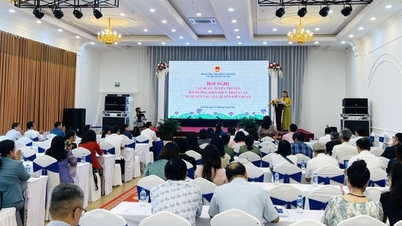







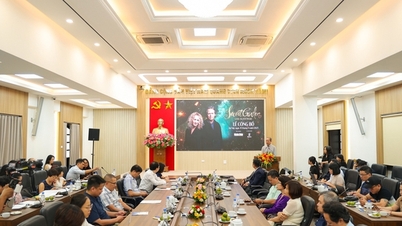





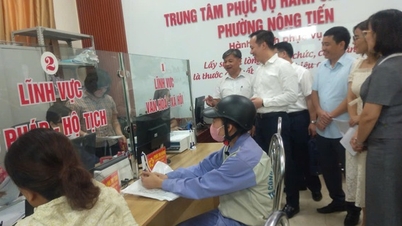

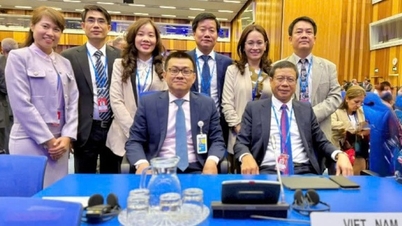
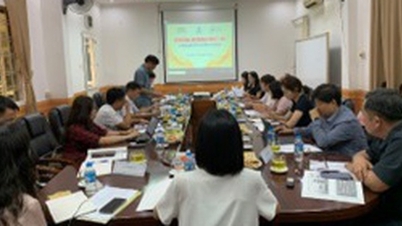
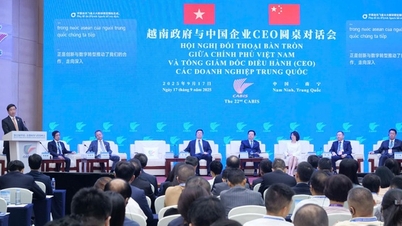

![[Photo] General Secretary To Lam presents the First Class Labor Medal to the Vietnam National Energy and Industry Group](https://vphoto.vietnam.vn/thumb/1200x675/vietnam/resource/IMAGE/2025/9/21/0ad2d50e1c274a55a3736500c5f262e5)








































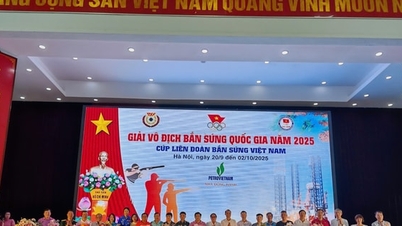



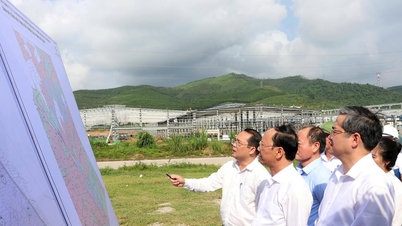



















Comment (0)